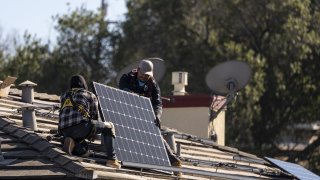
Almost every state in the country offers some kind of credit to rooftop solar owners who send excess power to the grid. But as solar power has become cheaper and more widespread, utilities in some states have pushed to curb the payments, experts say.
Battles around who pays for the energy are being waged across the country and could determine the future of home solar panels, which advocates say are crucial to weaning the energy system off power sources that emit carbon dioxide, a major cause of global warming.
In Florida, the state’s largest utility persuaded lawmakers to vote to gut the state’s rooftop solar credits, a measure that Gov. Ron DeSantis, a Republican, vetoed last week, saying it would hurt consumers. In California, state regulators, at utilities’ urging, are considering whether to cut rooftop solar incentives. In North Carolina, utility-backed proposals to change the state’s relatively generous rooftop solar subsidies have split environmentalists, with opponents saying the plan puts solar customers and installers at financial risk.
Get Boston local news, weather forecasts, lifestyle and entertainment stories to your inbox. Sign up for NBC Boston’s newsletters.
Rooftop solar has a “huge potential” to cut air pollution, create jobs, protect against outages and shrink utility bills, said Mark Jacobson, a professor of civil and environmental engineering at Stanford University. The technology will be vital for the U.S. to make the transition to all-renewable energy by 2050, he said.
“It’s such a low-hanging fruit, such an easy thing to do, to put panels on people’s roofs,” Jacobson said. “We are really shooting ourselves in the foot by not doing it.”



